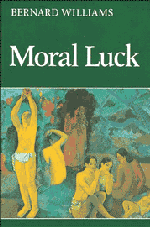Book contents
- Frontmatter
- Contents
- Preface
- Acknowledgements
- 1 Persons, character and morality
- 2 Moral luck
- 3 Utilitarianism and moral self-indulgence
- 4 Politics and moral character
- 5 Conflicts of values
- 6 Justice as a virtue
- 7 Rawls and Pascal's wager
- 8 Internal and external reasons
- 9 Ought and moral obligation
- 10 Practical necessity
- 11 The truth in relativism
- 12 Wittgenstein and idealism
- 13 Another time, another place, another person
3 - Utilitarianism and moral self-indulgence
Published online by Cambridge University Press: 05 June 2012
- Frontmatter
- Contents
- Preface
- Acknowledgements
- 1 Persons, character and morality
- 2 Moral luck
- 3 Utilitarianism and moral self-indulgence
- 4 Politics and moral character
- 5 Conflicts of values
- 6 Justice as a virtue
- 7 Rawls and Pascal's wager
- 8 Internal and external reasons
- 9 Ought and moral obligation
- 10 Practical necessity
- 11 The truth in relativism
- 12 Wittgenstein and idealism
- 13 Another time, another place, another person
Summary
My problem arises from the question of what one is to do in circumstances where there are strong reasons, particularly of a utilitarian kind, for doing something which one finds morally distasteful, and against which one has a strong personal commitment. It also of course involves questions of what one says and thinks about other people's actions in such situations. My concern is with a charge that can be brought against people who reject morally distasteful acts in such cases, namely that they are guilty of a certain kind of self-indulgence. When the agent's refusal takes the particular form of saying that while others, no doubt, will bring evil about, at least it will not come about through him, the charge may handily take the form of saying that the agent displays a possessive attitude towards his own virtue.
The problem particularly comes up in relation to utilitarianism. If the reasons for the act are, from a utilitarian point of view, strong enough, then utilitarians will say that the fact that the act is morally distasteful is certainly not an adequate reason against doing it in this case; as a general characteristic of acts of this sort, it is largely irrelevant to questions of what to do here and now, though it may be relevant to other aspects of the situation – thus we may think well of the agent for finding this kind of act distasteful, his reaction being taken as a reassuring sign of good character.
- Type
- Chapter
- Information
- Moral LuckPhilosophical Papers 1973–1980, pp. 40 - 53Publisher: Cambridge University PressPrint publication year: 1981
- 32
- Cited by

